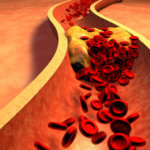
The normal digestion process requires digested food particles to travel through more than 25 feet of intestines. These food particles are always in motion. However, if a blockage or obstruction occurs it can put a stop to this movement. An obstruction of the bowel can occur anywhere along the digestive tract and prevents the passage of digested foods and fluids. If a bowel obstruction occurs, fluids, gas, food, and gastric acids will build up and harmful bacteria and intestinal contents will leak into the abdominal cavity. This can become a life-threatening complication.
One of the most common reasons for a bowel blockage is called fecal impaction. This is when a large mass of stool becomes stuck in the digestive tract. When the bowel becomes blocked by something other than a hard stool, it is called a bowel obstruction. It is important to know the symptoms of bowel obstruction as early diagnosis and treatment are important.
1. Severe Bloating
When the gastrointestinal tract becomes full of gas or air, it can cause the abdomen to become bloated. Most people describe being bloated as feeling tight, full, or swollen throughout the abdominal area. When a person has severe bloating the abdomen may become swollen or distended. It may feel hard to the touch and be quite painful. Often bloating will be accompanied by excessive gas and pain. However, if there is a blockage within the bowel, passing gas may be difficult or impossible.
If you are experiencing extreme bloating and also having difficulty passing gas even when you feel like you need to, it could be a symptom of a bowel blockage and you will need to discuss it with your doctor right away in order to get a proper diagnosis and treatment. A bowel obstruction can become dangerous quite quickly, which is why it is important to see a doctor as soon as possible.


